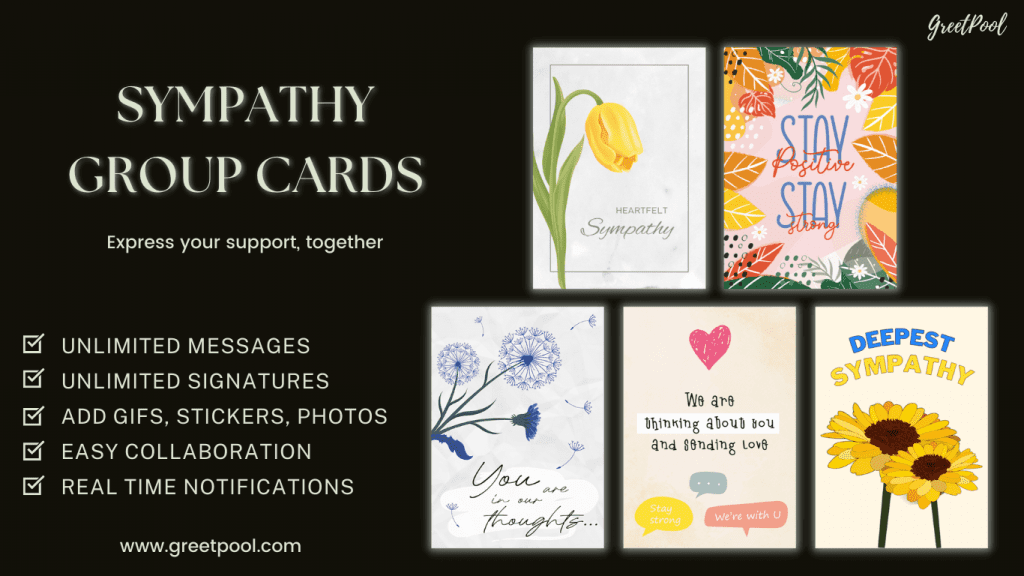At some point in our lives, we all face the challenge of offering condolences to someone who has experienced a profound loss. The weight of this task can be overwhelming, as we want to express our care and support sincerely. As a versatile writer with a passion for conveying emotions through words, I understand the power that language holds in providing solace during difficult times. Today, we embark on a heartfelt journey to explore the delicate art of crafting a sympathy card that truly touches hearts and offers genuine comfort.
Words have the power to heal or hurt, and when it comes to expressing condolences during difficult times, sensitivity and empathy are crucial. In this comprehensive guide, we will explore what not to say on a sympathy card, providing valuable insights on crafting a message that truly conveys care and compassion to the grieving person.2
Understanding the Importance of Sympathy Cards
Sympathy cards play a significant role in expressing condolences and offering solace to grieving individuals. They show that you are there for them, acknowledging their pain and supporting them in their time of sorrow. Writing a heartfelt sympathy message can provide a sense of comfort and let the recipient know they are not alone in their grief. With Sympathy Group Greeting Cards by GreetPool, you can express your condolences with the perfect blend of words and heartfelt sentiments. Our condolence cards are thoughtfully created to convey deepest sympathy, curated using comforting sympathy notes and uplifting sympathy card messages.
Every phrase we choose should resonate with an expression of sympathy and understanding, delicately conveying the warmest condolences to the bereaved person.
You may be interested in reading: How to Send Sympathy & Condolences Virtually with Group ecards

Phrases to Avoid in a Sympathy Message or Card
When writing a bereavement message, avoid these common pitfalls. A list of things not to say include
1. I Know How You Feel
Acknowledging the pain they are going through should be done by using the right words. One of the most common phrases that should be avoided in a sympathy card is “I know how you feel.” Even if you have experienced a similar loss and lost a loved one, everyone’s grief is unique, and assuming you understand their emotions can come across as dismissive. Instead, express empathy by saying, “I can’t imagine how difficult this must be for you.”2
2. It Was for the Best
Telling someone that their loved one’s passing was for the best or a blessing in disguise may seem comforting, but it can be hurtful and minimize the depth of their grief. Avoid making such statements and focus on offering support and love instead.
3. Time Heals All Wounds
While it’s true that time can ease the pain of loss, using this phrase may imply that the grieving individual should quickly move on. Grief is a personal journey, and it’s essential to let them process their emotions at their own pace. Instead, say, “Take all the time you need to heal.”
4. They Are in a Better Place Now
This sentiment may be rooted in good intentions, but it might not provide the comfort you intend in this time of grief. Respect the person’s beliefs and refrain from making assumptions about the afterlife. Instead, offer a sympathy quote such as, “May their happy memories bring you peace.”
5. At Least They Lived a Long Life
Even if the deceased person lived a long life, it doesn’t diminish the pain of their loss. Avoid diminishing the significance of the person’s passing with phrases like these. Instead, share a memory or highlight the positive impact the person had on others.
6. Stay Strong” or “Be Strong
Encouraging someone to be strong during their grieving process may unintentionally invalidate their emotions. Grieving is a natural process, and it’s essential to allow them to experience their feelings fully. Offer support by saying, “I am here for you.”
7. It’s time to let go
The grieving process is unique for each person, and pressuring them to move on prematurely can be hurtful. It’s vital to offer support and understanding. Instead, say, “Take all the time you need to heal and know that I’m here to listen whenever you want to talk.”
8. Everything happens for a reason
Implying that there’s a greater purpose behind the loss may not offer genuine comfort. Instead, focus on providing support and love during their time of need. You may want to say this instead to comfort them truly “Please know that you are not alone. I am here for you.”
9. I can’t imagine what you’re going through
While well-intentioned, this phrase can create a sense of isolation. Instead, express your willingness to listen and be there for them. Instead say “I can’t fully understand your pain, but I’m here to support you in any way I can.”
10. You’ll get over it
This phrase may come across as dismissive, suggesting that grief is a temporary phase that should be quickly overcome. It’s essential to offer ongoing support. Say Instead: “Take all the time you need to heal, and remember that I’m here for you.”
Know what to say to someone suffering through the loss of a loved one: Condolence Message Examples: Finding the Right Words For A Sympathy Card

Things to Avoid When Writing a Sympathy Card Message
When writing a sympathy card message, it’s crucial to avoid certain things or gestures that may inadvertently cause discomfort or hurt to the recipient. Here are some key things to avoid:
- Avoid Downplaying the Loss: Refrain from minimizing the significance of the person’s passing or suggesting that it’s for the best.
- Avoid Clichés: Steer clear of using common clichés that may come across as insincere or superficial.
- Avoid Comparisons: Avoid comparing their loss to others’ experiences, as each person’s grief is unique.
- Avoid Religious Assumptions: Be mindful of making assumptions about the person’s religious beliefs and avoid imposing your beliefs onto them.
- Avoid Offering Solutions: Don’t try to offer quick solutions or advice on how they should handle their grief.
- Avoid Rushing the Grieving Process: Allow them the time and space they need to grieve, and don’t pressure them to move on quickly.
- Avoid Self-Centeredness: Keep the focus on the grieving person and avoid sharing personal stories that divert attention from their loss.
- Avoid Mentioning Legal Matters: Avoid discussing legal matters or inheritance in the sympathy card.
- Avoid Humor: Humor may not be appropriate in a sympathy card, as it can be misinterpreted as insensitivity.
- Avoid Signing Off Casually: Use a compassionate closing rather than casual phrases.
- Avoid Overwhelming Length: Keep the message concise and heartfelt, as excessively long messages may be overwhelming.
A thoughtful and sincere sympathy card message should avoid anything that might be dismissive, insensitive, or self-centered. It’s essential to approach the message with genuine empathy, acknowledging the depth of the recipient’s loss and providing comfort and support during their time of grief.

Offering Genuine Condolences
When writing a condolences message, these are some phrases you may include to offer your deepest condolences. Here is what you say to someone grieving
- “You Are in My Thoughts and Prayers” This classic expression is timeless for a reason—it offers a simple yet heartfelt message of support. Letting someone know that they are in your thoughts and prayers can provide comfort during challenging times.
- “I’m Here for You” Sometimes, the most meaningful thing you can say is that you are there for the person. Offering your presence and support can be more valuable than finding the perfect words.
- “Their Memory Will Forever Live On” Acknowledging the lasting impact the deceased had on the lives of others can bring solace to the grieving. Share a memory or a positive story about the person to keep their memory alive.
- “I’m Sending You Love and Strength” Expressing love and offering strength is a way to show your care and compassion for the person enduring loss. Let them know that you are there to lean on if they need it.
- “Please Know You Are Not Alone” Grieving can often feel isolating, but reminding the person that they have a support system can be comforting. Offer your willingness to listen and be there for them whenever they need it.
Let us remember that our words are powerful tools, and when wielded with love and understanding, they can leave a lasting impression on those who receive them. You can also check out our detailed article on what to write on a sympathy card for 100+ examples and sample condolence messages.
Closing Thoughts
The words we choose on a sympathy card can profoundly impact those who are grieving and in this sad time. It is crucial to be mindful of the phrases we use in our personal sympathy message, avoiding common pitfalls that may inadvertently hurt or dismiss the grieving person’s emotions. Instead, offer genuine condolences, express empathy, and remind them that they are not alone during this challenging time. By following these guidelines, you can craft a thoughtful and comforting message that will provide solace and support to the bereaved person.
Remember, empathy, love, and compassion are the key ingredients to writing a heartfelt sympathy card that truly makes a difference. Show your care through your words, and your message will be a source of comfort and healing for those who receive it.






